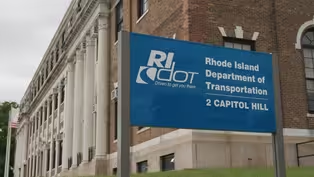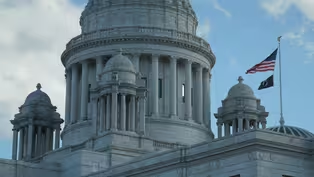
Nonviolence Institute
Clip: Season 6 Episode 21 | 9m 54sVideo has Closed Captions
Report on how violence affects the mental health of young people.
In-depth report by contributor Anaridis Rodriguez on how violence affects youth and mental health and how the Nonviolence Institute in Providence is working with young people and teaching them how to cope in non-violent ways.
Problems playing video? | Closed Captioning Feedback
Problems playing video? | Closed Captioning Feedback
Rhode Island PBS Weekly is a local public television program presented by Ocean State Media

Nonviolence Institute
Clip: Season 6 Episode 21 | 9m 54sVideo has Closed Captions
In-depth report by contributor Anaridis Rodriguez on how violence affects youth and mental health and how the Nonviolence Institute in Providence is working with young people and teaching them how to cope in non-violent ways.
Problems playing video? | Closed Captioning Feedback
How to Watch Rhode Island PBS Weekly
Rhode Island PBS Weekly is available to stream on pbs.org and the free PBS App, available on iPhone, Apple TV, Android TV, Android smartphones, Amazon Fire TV, Amazon Fire Tablet, Roku, Samsung Smart TV, and Vizio.
Providing Support for PBS.org
Learn Moreabout PBS online sponsorship[Teacher] Rashad, is that you?
- [Arius] It may be spring break for these Rhode Island teens, - Yes, Ms.
Maple.
- [Arius] But here in Providence, they're getting a different kind of education.
- When conflict shows up.
How do you handle conflict in your community?
- Their leader, Felipe Flip Mercedes, is teaching Martin Luther King Jr's theory of nonviolence in the hopes of turning these kids into a force for peace.
We sat down with Bentley Teverez, Sophia Laura, Cariana Castillo, and Jerry Nicolo.
What would you say teenagers are dealing with today?
- People are experiences very bad, traumatic experiences.
A lot of these kids nowadays, like they're with guns, they're with these things that could kill people.
These are weapons.
- [Arius] According to the most recent statistics on gun violence from Johns Hopkins, in 2022, guns were the leading cause of death for children and teens in America, taking more lives than car crashes or cancer.
- I feel like all this violence, it needs to stop in the community.
All of the violence and all the bullying and all that other stuff that really does affect people and their brains.
- Young people who experience chronic community violence have the same sort of symptoms and kind of markers as those who have experienced wartime violence.
- [Arius] Dr. Yvorn Aswad has examined how community violence, violent acts that take place within a neighborhood, impacts mental health in youth.
- That when a person's experiencing just high levels of chronic stress, that raises their baseline body cortisol level, which is a stress hormone.
- [Arius] Typically, he says when a person experiences a stressful event, their cortisol level increases and then when the event is over, it goes back down to baseline.
- But when folks are living in kind of chronic, ongoing stressors, ongoing trauma, that cortisol level just kind of is up and is stuck.
- [Arius] That can lead a person to be hypervigilant, looking out for threats long after a dangerous moment has passed.
And in teens the trauma can culminate an outburst.
- Because that teenager never got that consoling that they should have gotten when they were a younger child to be able to understand that you can learn to just like say, "Hey, you hurt me," or "Hey, my feelings are hurt."
It doesn't have to kind of translate into like, I gotta beat somebody up to say that like my feelings are hurt.
- It can be a difficult lesson to learn.
Lisa Pina-Warren grew up in Providence.
What did you learn about resolving conflict growing up?
- I can hear my mother's voice saying it.
"Don't come home and say someone put their hands on you and you didn't do anything."
"He hit you.
You hit them back."
You know that's you're teaching violence.
- [Arius] She would go on to see the toll of violence firsthand.
In 1996, her older brother, Louis, died in a car crash following a high speed chase with the police.
In the wake of his death, she began working in case management and then faced the loss of a special client named Dionne Robinson.
- He had graduated from high school and a car drove by and shot him and he didn't survive.
And that really hit me different.
I just couldn't make sense of it.
- [Arius] She had a candlelight vigil for Dionne and at the ceremony, a man named Teny Gross approached her.
- He said, "What are we gonna do?
And he said it was such passion, "What are we gonna do about this?"
- [Arius] At an organization that would go on to be called the Non-Violence Institute, he was working to prevent the root causes of violence.
Pina-Warren joined the team.
- We have nonviolence training and we also respond anytime there is a victim of violence.
And this is our memorial room.
A space where loved ones can memorialize their loved one that they lost.
- [Arius] Grappling with grief is a regular part of the job.
- I have family and friends that will say to me, "How can you do this work?
And you've been doing it for a really long time."
I did take a break at one point, I thought I was done.
- [Arius] She decided to take a step back until one day she received a call.
- The young person I was working with had gotten killed.
He was shot and killed.
And not that I want any of our youth to go to prison, but I had then received a call stating that they had made an arrest and I was relieved for this young man's family.
And after that relief, in that same conversation, they gave me the name of the person that they arrested and it was my nephew.
And that was really, really, really difficult.
This is my brother's son, my brother that I lost and I wanted to his son have a different life.
You know, I wanted to see him succeed and do well.
But it also made me feel like I wanted to come back here because the work wasn't over.
My nephew is still incarcerated and I visit him and we talk regularly.
But you know, my mission and my purpose is to help young people to not make those decisions.
- [Arius] 22 years since that first conversation with Teny Gross, Pina-Warren fills her old mentor shoes as the Executive Director of the Institute.
- You know, when we talk about nonviolence, it really is a skill.
It's not a magic wand.
It doesn't make everything better.
But when you study it and you practice it and you understand it, then it's something that can really change your life.
- [Arius] For some, it's a tough sell.
Despite receiving a $200 stipend for the week and having Pina-Warren as a grandmother, Bentley Teverez had his doubts.
- Day one, I came up in here angry, actually.
I wasn't trying to talk to nobody.
I wasn't in the mood for it.
I just wanted to do this for the money.
That's the whole reason I was here.
But as I'm going day on and day on, I started becoming more comfortable and then looking forward to it.
- What are ways people in your city celebrate?
- Jerry?
- Going to block party.
- Black party.
- On day four of non-violence training students discuss the ways a healthy community takes care of itself.
What are some of the tactics or strategies or steps that you are learning to resolve conflict without violence?
- Just stop, think, and then visit the same thing tomorrow.
'Cause when you have all the anger buildup, you're not really thinking straight.
- Conflict is like a car in neutral and whichever way you push it is whichever way it goes.
So if you push it towards the bad side, it's gonna go bad.
If you push it to be calm and try and be peaceful, it's probably gonna end up peaceful.
- It's just giving you the ability or helping you work on that skillset to be able to kind of pause, to be mindful, to really think about the situation before you react on it.
- How does your community grieve in positive ways?
- Healthy therapy?
Big time.
All right Jerry?
- [Jerry] How do you talk to somebody in the time of need?
- Talk to someone.
- There's multiple young people in the room that have a loved one that's incarcerated.
And there's multiple young people in the room that lost someone to violence.
We have a lot of adults that are still holding on to a lot of life's traumas and hurts and things that they haven't healed from.
- We learn about values.
We've learned how to control our emotions.
- Not a lot of kids get help with mental health problems these days.
Not a lot of kids actually talk about their emotions or issues.
So this is actually a great program coming in here, getting kids to talk.
- We have to allow young people to express their feelings and to talk about them.
- So they can be free.
- So they can be free.
Video has Closed Captions
Clip: S6 Ep21 | 11m 40s | Engineers say technology could have provided necessary insight years earlier. (11m 40s)
Video has Closed Captions
Clip: S6 Ep21 | 3m 3s | Lawmakers have about $65 million more to work with to craft the budget than anticipated. (3m 3s)
Providing Support for PBS.org
Learn Moreabout PBS online sponsorship
- News and Public Affairs

Top journalists deliver compelling original analysis of the hour's headlines.

- News and Public Affairs

FRONTLINE is investigative journalism that questions, explains and changes our world.












Support for PBS provided by:
Rhode Island PBS Weekly is a local public television program presented by Ocean State Media

